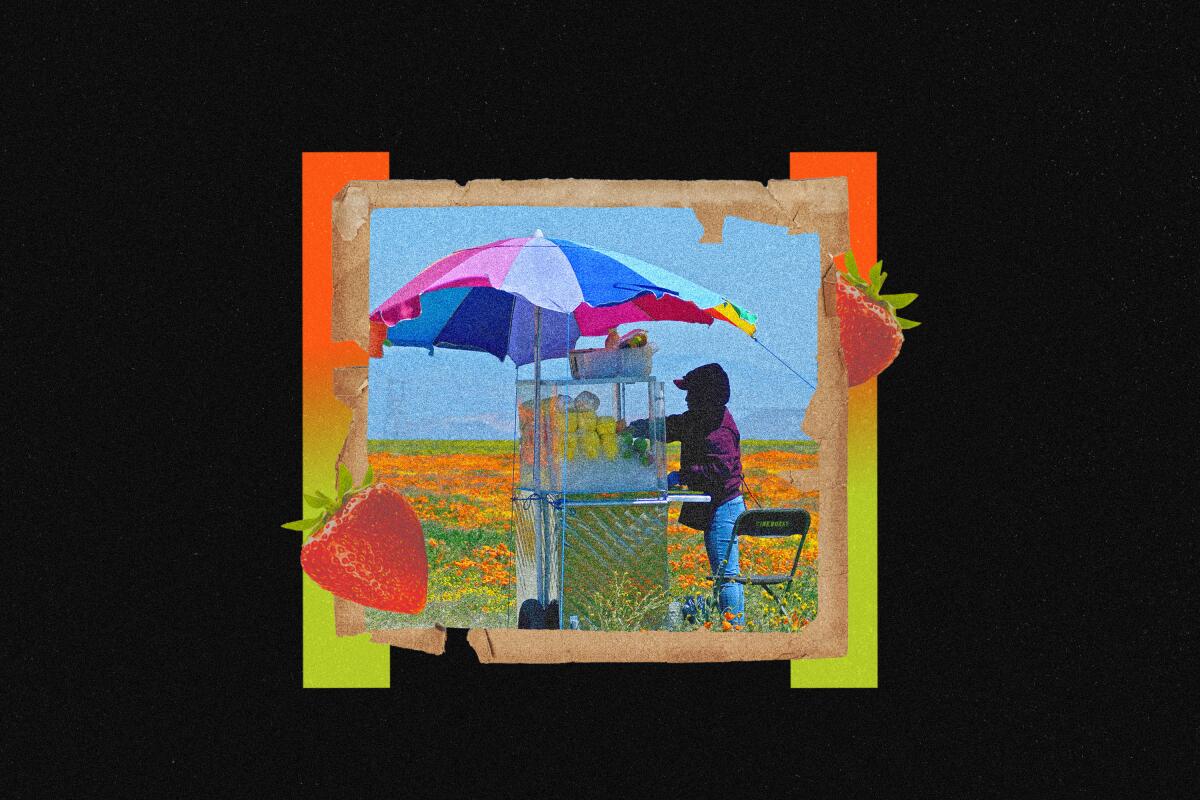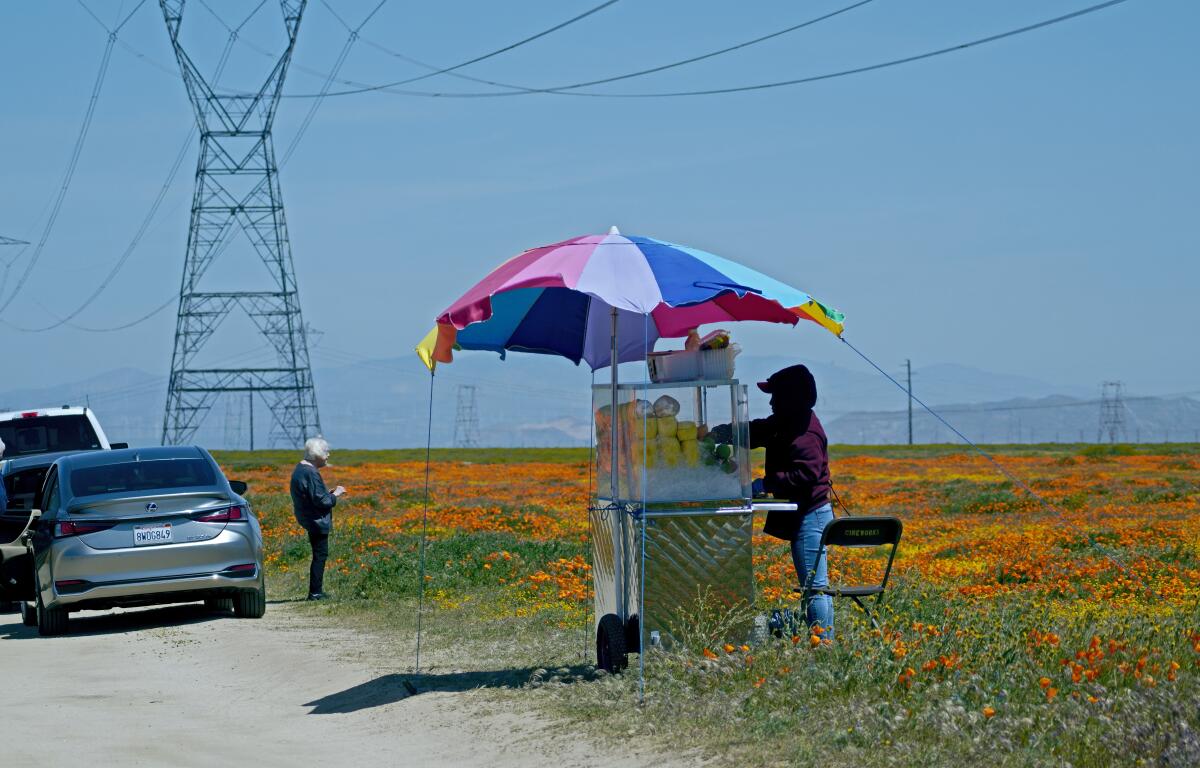Latinx Files: Leave street vendors alone

- Share via
I can’t believe this still needs to be said, but please, for the love of whatever you consider holy, leave street vendors alone.
Over the weekend I stumbled across a TikTok video uploaded by Edin Alex Enamorado, a self-proclaimed street food vendor activist, which began with an interaction between a woman selling fruit near the University of California Riverside campus and Gerry Bomotti, a high level administrator at the university. Though the brief interaction between the two is inaudible, it appears that Bomotti instructed the vendor to pack up her cart and leave.
This is later confirmed in the video by Bomotti himself, who explains to Enamorado that he had asked her to leave and not come back because she didn’t have permission to be there. In response, Enamorado asks Bomotti if it was part of his job description as the university’s vice chancellor of planning, budget and administration “to go out there without any translator, to speak to someone and assume that they don’t have the permits required.”
The contentious video went viral. As of this writing, it had accrued more than 4.5 million views on TikTok.
I reached out to Bomotti, who told me over the phone that one of his responsibilities is oversight of UCR’s environmental health and safety department, which oversees dining and food services. Bomotti said he verified with them that the vendor in question did not have permission to set up on campus before approaching her.
“We have union contracts for food service workers, “ Bomotti said, adding that there are opportunities “to bring on nonuniversity food service operations, but there’s a very specific protocol and approval process that has to be gone through.”
Bomotti confirmed that he did instruct the vendor to not return.
When asked if he’d had similar interactions with nonapproved food vendors in the past, Bomotti claimed that this was the first he had personally encountered.
Bomotti also said he was aware of the optics of the video and had received several emails and phone calls about the incident, but noted the viral clip had been edited and it was up to the viewer to make their own determination.
Bomotti also said that the university takes its union contract with food service workers “very seriously.”
“Having this one vendor is not going to take over all of our food service,” he acknowledged, adding that he had “to be fair and equitable to other vendors that would be interested.”
Near the end of our conversation, I asked Bomotti if he was aware of a recent string of incidents in which food vendors had been harassed or attacked across Southern California, and he replied that he wasn’t aware of them.
The Latinx experience chronicled
Get the Latinx Files newsletter for stories that capture the multitudes within our communities.
You may occasionally receive promotional content from the Los Angeles Times.
My takeaway from this whole situation is that it could have easily been avoided. I understand that Bomotti has a job to do, but instead of making life harder for food vendors, we should collectively, as my colleague Gustavo Arellano put it in a July 2022 column, “support people hustling to make a living.”
There’s no denying that street vendors are a vital part of the fabric of Los Angeles and Southern California. They are there for all our moments of leisure, whether it be the bacon-wrapped hot dog vendors outside the city’s sports venues — shout out to the couple who set up in front of the United Oil gas station on Sunset Boulevard in Echo Park and also sell pupusas — or the fruit vendor photographed by my colleague Raul Roa. The enterprising woman set up shop at the side of the road in Lancaster on Monday to catch the Superbloom 2023 crowds.

As per the incident at UCR, there is a silver lining. The Movimiento Estudiantil Chicanx de Aztlan (MECHA) chapter organized a buy-out for Vicenta, the food vendor in question. Judging by the social media postings, it was quite successful.
The kids are alright.
I also reached out to Vicenta via phone on Wednesday afternoon, but my call went to voicemail. She was no doubt busy hustling.
Consider subscribing to the Los Angeles Times
Your support helps us deliver the news that matters most. Become a subscriber.
Things we read this week that we think you should read
— This story from our L.A. Times en Español colleague Selene Rivera sticks with you in a number of ways. Even through the pain of the loss of his wife, Ricardo Rodriguez was able to honor her wishes of applying for permanent residency in the U.S. He was able to receive the ability to legalize his immigration status thanks to an underutilized petition that confers status to widows of citizens.
The story not only highlights the pain of family separation, as his wife, Simona, died suddenly while visiting family in Mexico and Ricardo was not able to travel to say goodbye to her, but of the convoluted immigration process that requires people to jump through so many hoops in order to become a legal resident.
— The second weekend of Coachella kicks off tomorrow with another headlining performance by Bad Bunny. While his first set was seen as a crowning achievement for the Puerto Rican artist, it was also mired in some technical issues and the recurring negative buzz around his Time Magazine interview. One of my favorite think pieces on this historic performance came from Bianca Betancourt of Harper’s Bazaar.
— And speaking of the Coachella Valley, ESPN senior writer and friend of the newsletter Roberto José Andrade Franco wrote about boxing trainer Joel Díaz and the gym he built in the punishing desert that churns out world champions.
— My L.A. Times en Español colleague Reed Johnson, has this deep dive into the life of author and publicist Luis Reyes, who has chronicled Latino Hollywood for decades. It’s worth a read just for the great anecdotes on old Hollywood, but it can also double as a history book on the exclusion of Latinos in movies.
— If you are looking for a good book to pick up (here’s also a shameless plug for this weekend’s L.A. Times Festival of Book) check out this thriller by Orlando Ortega-Medina. This review by author Daniel A. Olivas is also a great piece of writing.
— The best thing on the Latinternet this week: Never have I felt more FOMO in my life than after finding out that Ramón Ayala, the accordion god and the pride of Hidalgo, Texas (Puro 956 Cuh!), threw out the first pitch at Wednesday’s Dodgers game against the New York Mets. The Dodgers sadly couldn’t win for Don Ramón (cue “Tragos Amargos”), but at the very least they gave us these great photos of him standing next to Fernando Valenzuela. What do you think they talked about? Wrong answers only.
The Latinx experience chronicled
Get the Latinx Files newsletter for stories that capture the multitudes within our communities.
You may occasionally receive promotional content from the Los Angeles Times.




